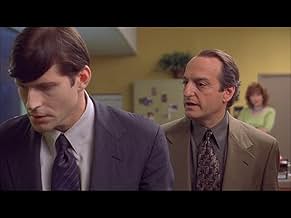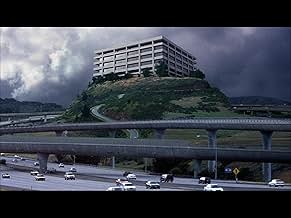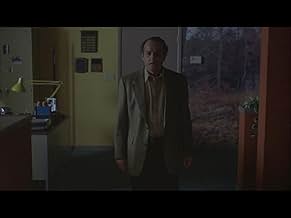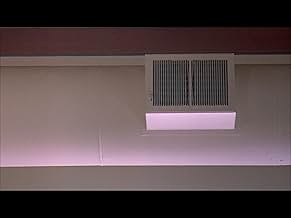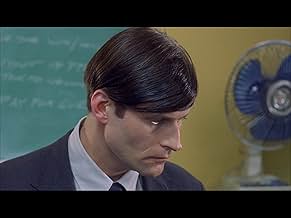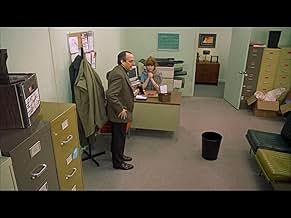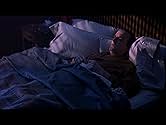NOTE IMDb
6,4/10
2,3 k
MA NOTE
Ajouter une intrigue dans votre langueA clueless boss has no idea what to do with his mundane office worker whose refusal of duties only gets worse each passing minute.A clueless boss has no idea what to do with his mundane office worker whose refusal of duties only gets worse each passing minute.A clueless boss has no idea what to do with his mundane office worker whose refusal of duties only gets worse each passing minute.
- Réalisation
- Scénario
- Casting principal
- Récompenses
- 1 nomination au total
Stu Klitsner
- Professor Bum
- (as Stuart Klitsner)
Catherine DiNapoli
- Rocky's Girlfriend
- (as Catherine di Napoli)
Avis à la une
I found this movie disturbing. Advertised as a comedy, it is no such thing. There is a lot of comedy in there, all right, but overall the themes are heavy, disturbing, even horrific. Crispin Glover's performance is flawless, and his role in the story is to pose a lot of questions that never get answered. The story revolves around the other characters' failure to figure him out. The new employee at the Public Records Office in an unnamed city starts out doing a great job, but he does less and less work as time goes on until he is spending most of his time refusing requests to perform any job tasks, or simply gazing up into the air-conditioning vent. They fire him, but he doesn't leave. It gets worse from there, believe me.
I never heard of this movie until couple of weeks ago when I saw it on TV. This brings my question - where do all the good, "small", independent movies go after they've been created and screened on the Sundance Film Festival? How do we learn about their existence? Where do we read about them? And most importantly, where can we see them?
Bartleby, the first film directed and written by Jonathan Parker is a real gem - modern version of the Melville's short story "Bartleby the Scrivener" with absolutely amazing cast.
Crispin Glover plays Bartleby, the man who was hired, but preferred not to work and who was fired, but preferred not to leave. David Paymer is his clueless boss who tries to understand what he is dealing with. Glenne Headly is Vivian, an office secretary, the woman of many adorable talents; Maury Chaykin, and Joe Piscopo are his coworkers in the one of the most boring office ever existed. The office is located in the building that sits on the top of the hill and comes directly from the El Greco's painting "View of Toledo" with its atmosphere of mystery, danger, and loneliness: Would you like to work in the building like that? I'd prefer not to...
I believe Parker made a very impressive debut - the film is creatively shot, the use of music is amazing - Beethoven's sonata turns into a creepy, quirky and moody Bartleby's theme for which Parker used theremin - very interesting and unique musical instrument. Parker and his co -writer transported 'Bartleby the Scrivener' into a surreal and absurd black comedy - satire on bureaucracy and alienation in the insane and cruel modern world.
Franz Kafka's name came to my mind more than once while watching the film - he would've loved that absurd, funny but dark and sad story. Also, if ever a good movie is made about one of the greatest and tragic writers of 20th Century, Crispin Glover should play him. Just compare their pictures...
Bartleby, the first film directed and written by Jonathan Parker is a real gem - modern version of the Melville's short story "Bartleby the Scrivener" with absolutely amazing cast.
Crispin Glover plays Bartleby, the man who was hired, but preferred not to work and who was fired, but preferred not to leave. David Paymer is his clueless boss who tries to understand what he is dealing with. Glenne Headly is Vivian, an office secretary, the woman of many adorable talents; Maury Chaykin, and Joe Piscopo are his coworkers in the one of the most boring office ever existed. The office is located in the building that sits on the top of the hill and comes directly from the El Greco's painting "View of Toledo" with its atmosphere of mystery, danger, and loneliness: Would you like to work in the building like that? I'd prefer not to...
I believe Parker made a very impressive debut - the film is creatively shot, the use of music is amazing - Beethoven's sonata turns into a creepy, quirky and moody Bartleby's theme for which Parker used theremin - very interesting and unique musical instrument. Parker and his co -writer transported 'Bartleby the Scrivener' into a surreal and absurd black comedy - satire on bureaucracy and alienation in the insane and cruel modern world.
Franz Kafka's name came to my mind more than once while watching the film - he would've loved that absurd, funny but dark and sad story. Also, if ever a good movie is made about one of the greatest and tragic writers of 20th Century, Crispin Glover should play him. Just compare their pictures...
7B24
The film touches on some parts of the original story very aptly. I thought the Chaykin-Piscopo match was very close indeed to what Melville intended. As to Crispin Glover, no other movie actor of his stature is creepy enough and palpably slow-witted enough to fit the role -- not even the younger editions of a Brando or Hopper or Walken, who would overact monstrously in one form or another.
Most viewers seem to surrender to the misconception that the story is all about Bartleby. In fact, the narrator undergoes the most profound change within its context. And in that sense this film version fails because the Paymer character is made out to be a complete sap, rather than the seriously introspective and well-educated man of the original.
No one in 1853 knew anything of co-dependency in relation to addictions and other mental disorders, but Melville was prescient in that regard. The apparent despondency of Bartleby (characterized in the original as late of the Dead Letter Office) has no bounds, but it is in his employer's character we are led to see that this relatively new concept involving an excess of identification with the subject person can result in similar debilitation on the part of the caregiver.
It falls as well into the category of feature-length films based on short stories destroyed by too much padding and extraneous activity we used to call "stage business." It should be as spare as the slowly emptying mind of Bartleby himself.
Most viewers seem to surrender to the misconception that the story is all about Bartleby. In fact, the narrator undergoes the most profound change within its context. And in that sense this film version fails because the Paymer character is made out to be a complete sap, rather than the seriously introspective and well-educated man of the original.
No one in 1853 knew anything of co-dependency in relation to addictions and other mental disorders, but Melville was prescient in that regard. The apparent despondency of Bartleby (characterized in the original as late of the Dead Letter Office) has no bounds, but it is in his employer's character we are led to see that this relatively new concept involving an excess of identification with the subject person can result in similar debilitation on the part of the caregiver.
It falls as well into the category of feature-length films based on short stories destroyed by too much padding and extraneous activity we used to call "stage business." It should be as spare as the slowly emptying mind of Bartleby himself.
Herman Melville's `Bartleby the Scrivener' has always been one of my all-time favorite short stories, a masterpiece of tone that features one of the most enigmatic characters in literary history. With devastating wit and understated irony along with a keen appreciation for the absurdist and the surreal - Melville tells the tale of a well meaning though banally efficient pragmatist who is forced to reconsider his values when he runs up against a certified (and perhaps certifiably insane) nonconformist. After he hires Bartleby to be a clerk in his office, the (unnamed) employer quickly discovers that the taciturn, quirky young man has no intention of doing any work - and, even more strangely, that he feels no compulsion to explain his state of self-imposed inertia. What makes Bartleby fascinating is that he is a nonconformist simply by nature and not because he has any real bone to pick with society or the people around him. This lack of explanation frustrates the boss, of course, and some readers as well. But it is Bartleby's defining phrase, `I would prefer not to' - delivered like a refrain throughout the course of the story - that speaks for those in society who question the value and purpose of the myriad irrelevant tasks we are compelled to perform as we make our way through life.
Melville conceived his story as a stinging indictment aimed against the dehumanizing effect of the business world's bureaucratic structure. How appropriate, then, that the makers of this current film version (now called simply `Bartleby') have chosen to set the tale in the present day, when that guiding philosophy has become, if anything, even more pronounced. David Paymer is splendid as the public records office manager who finds himself embroiled in an epic battle of wills against a force he cannot understand yet, in some bizarre fashion, can also not help identifying with and admiring. Crispin Glover is the pasty-faced Bartleby who seems to slip further and further into a state of catatonic madness as the story progresses. In their screenplay, Jonathan Parker (who also directed the film) and Catherine Di Napoli have retained the flavor of the original, combining hilarious and poignant moments in roughly equal measure. For even while we are laughing at the absurdity of both Bartleby and the other eccentric staff members in the office, we are also being made aware as the boss is of just how unique and admirable a creature Bartleby truly is.
With its deliberate pacing, its starkly antiseptic, parti-colored sets and its eerily moody musical score (some of it reminiscent of Bernard Herrmann's work for `The Day the Earth Stood Still'), the film takes us to a highly stylized world where the events we see depicted come to make total sense. Only the most blatant realist will be inspired to question the wisdom of the main character's actions concerning Bartleby. All the rest of us will see the boss for the open-minded humanitarian Melville intended him to be.
Parker has pulled together an interestingly offbeat group of actors to serve as his supporting cast, including Dick Martin, Joe Piscopo and Carrie Snodgrass. Glenne Headly is particularly wonderful as a flirtatious office worker who spends most of her time making suggestive comments, gestures and even foodstuffs to lure men her way.
It's the extraordinarily controlled and brilliantly delivered deadpan humor that makes `Bartleby' an adaptation worthy of its source. This movie proves that Melville's nonpareil creation will forever be a timeless tale.
Melville conceived his story as a stinging indictment aimed against the dehumanizing effect of the business world's bureaucratic structure. How appropriate, then, that the makers of this current film version (now called simply `Bartleby') have chosen to set the tale in the present day, when that guiding philosophy has become, if anything, even more pronounced. David Paymer is splendid as the public records office manager who finds himself embroiled in an epic battle of wills against a force he cannot understand yet, in some bizarre fashion, can also not help identifying with and admiring. Crispin Glover is the pasty-faced Bartleby who seems to slip further and further into a state of catatonic madness as the story progresses. In their screenplay, Jonathan Parker (who also directed the film) and Catherine Di Napoli have retained the flavor of the original, combining hilarious and poignant moments in roughly equal measure. For even while we are laughing at the absurdity of both Bartleby and the other eccentric staff members in the office, we are also being made aware as the boss is of just how unique and admirable a creature Bartleby truly is.
With its deliberate pacing, its starkly antiseptic, parti-colored sets and its eerily moody musical score (some of it reminiscent of Bernard Herrmann's work for `The Day the Earth Stood Still'), the film takes us to a highly stylized world where the events we see depicted come to make total sense. Only the most blatant realist will be inspired to question the wisdom of the main character's actions concerning Bartleby. All the rest of us will see the boss for the open-minded humanitarian Melville intended him to be.
Parker has pulled together an interestingly offbeat group of actors to serve as his supporting cast, including Dick Martin, Joe Piscopo and Carrie Snodgrass. Glenne Headly is particularly wonderful as a flirtatious office worker who spends most of her time making suggestive comments, gestures and even foodstuffs to lure men her way.
It's the extraordinarily controlled and brilliantly delivered deadpan humor that makes `Bartleby' an adaptation worthy of its source. This movie proves that Melville's nonpareil creation will forever be a timeless tale.
My first reaction to "Bartleby" is that this movie is much like a previous Crispin Glover effort, "Rubin and Ed" about a strange, directionless man with little background, who plods his way through life carelessly. Some of the awkward moments and surreal dialogue and movements within Bartleby seem to be forced, trying to hard, to capture a campy feel. The film doesn't quite reach a campy status though because of this. Although Glover captures his quirky behavior perfectly, from staring at the air vent for hours, to endlessly saying "I prefer not to.." to every work request, and the dynamics of the working relationship with his boss are interesting at times. Joe Piscopo and Maury Chaykin have some strange roles as co-workers who are up to no good... how these guys stay employed are a mystery.
Bartleby has two major problems. One is, it just gets boring. A good slow movie can do and say a lot, but Bartleby just seems to be obsessed more with how weird it can be, how far it can push the surrealism of its cast and the corporate buildings on the hills. Another thing is, why does Bartleby's boss take such an interest in him? What is the motivation? Perhaps this is best explained in Herman Melville's book, from which this movie is based. For a Crispin Glover fan, this is even barely worth watching.
Bartleby has two major problems. One is, it just gets boring. A good slow movie can do and say a lot, but Bartleby just seems to be obsessed more with how weird it can be, how far it can push the surrealism of its cast and the corporate buildings on the hills. Another thing is, why does Bartleby's boss take such an interest in him? What is the motivation? Perhaps this is best explained in Herman Melville's book, from which this movie is based. For a Crispin Glover fan, this is even barely worth watching.
Le saviez-vous
- AnecdotesDick Martin's final acting performance.
- GaffesWhen "The Boss" goes to check out a new place for their office, he settles on a place with no electrical outlets on 3 of the walls. (The 4th wall is not shown) There's a Xerox and every desk has a computer. This arrangement would be completely unacceptable for any office manager.
- Crédits fousBefore the opening credits begin, viewers are given a portrait and short biography of Herman Melville, upon whose story the film is loosely based.
- ConnexionsReferenced in Stargate: Atlantis: The Lost Boys (2005)
- Bandes originalesPhantasie #3 In D Minor
Written by Wolfgang Amadeus Mozart (as Mozart)
Background music on piano by Nancy Spottiswoode
Meilleurs choix
Connectez-vous pour évaluer et suivre la liste de favoris afin de recevoir des recommandations personnalisées
- How long is Bartleby?Alimenté par Alexa
Détails
Box-office
- Montant brut aux États-Unis et au Canada
- 148 479 $US
- Week-end de sortie aux États-Unis et au Canada
- 14 599 $US
- 27 mai 2002
- Montant brut mondial
- 148 479 $US
Contribuer à cette page
Suggérer une modification ou ajouter du contenu manquant


